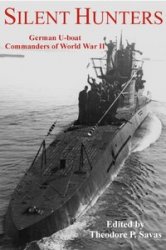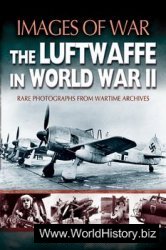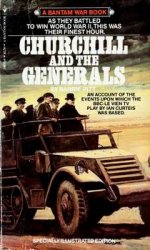In early May, General William Tecumseh Sherman moved his 110,000-man army out of Chattanooga into Georgia. There he would take on General Joe Johnston's
45,000 Confederate troops. Sherman's goal was to take the vital rail and industrial center of Atlanta, the Gate City of the South.
Southern Revenge. Sherman outnumbered Johnston two to one, but the Confederates were counting on the Southern landscape to aid their defense. The rivers and mountains of northwest Georgia and its blistering heat would pose mean barriers to Sherman’s advance. Johnston hoped to bleed the Union army badly enough that Lincoln would lose his bid for reelection. If that happened, the North might agree to talk.
As Johnston had hoped, the Union advance into the deep South was no Sunday picnic. The heat was exhausting. The dust turned blue Union coats to a uniform gray. Even the insects were savage. One Illinois soldier complained in his diary; "They will crawl through any cloth and bite worse than fleas.” Desperate soldiers rubbed bacon grease on themselves to keep the pests away.
Still Sherman pressed on, and after a series of indecisive but bloody battles, Johnston’s back was to Atlanta. Confederate President Jefferson Davis was never a believer in Johnston’s military skills, and he'd had enough of the general’s constant retreat in front of Sherman. Davis decided to remove Johnston from command, replacing him with John Bell Hood. Hood was a proven fighter, but he had never commanded a whole army. Now he would have to learn his trade while trying to stop the grim-faced Sherman.
Defending Atlanta. Hood, who had lost an arm at
Gettysburg and a leg at Chattanooga, wasted no time. He immediately attacked the Yankees east and north of the city. Though Hood’s forces stunned the Union troops, his bloody frontal attacks were failures. In the battle for Atlanta, Hood lost 12,500 men. He barely had enough to defend the trenches around the city.
Sherman slowly surrounded Atlanta, choking off vital roads and railroads. On September 1, the defeated Hood was forced to abandon the city. He burned the military and rail offices and marched south. The city was now a ghost town. Sherman sent a telegraph to his president: “Atlanta is ours....” The capture of the Southern jewel practically assured Lincoln’s reelection.
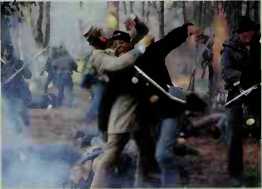
In 1915, the War Between the States was the subject of one of the first “epic” movies, a three-hour-long silent film. Birth of a Nation, directed by D. W. Griffith, brought the drama of war-torn Northern and Southern
Families to the screen. The battle scenes achieved a realism unlike anything seen before. They remain impressive to this day.
But the film was, and is, controversial. D. W. Griffith was a Southerner. He focused on specific Southern attitudes to the war, the South’s defeat, and its aftermath. The abolition of slavery, then, is seen as a tragedy. Southern whites are shown suffering under the control of newly freed slaves. Ku Klux Klan members are portrayed as heroes who come to the rescue of defeated white Southerners.
When first released, Birth of a Nation aroused serious controversy, but disapproval was tempered. The film’s technical and dramatic achievements were stunning. Even those who disagreed with some of the film’s content were impressed with its artistic achievement.
In 1939, another Civil War film. Gone With the Wind, became one of the most popular Hollywood pictures of all time. Another epic.
This film focused on the trials of a selfish Southern woman who survives the Civil War, though most everyone around her keels over. As Atlanta burns and the Confederate army flees, a camera passes over a huge sea of dead and wounded Southern soldiers. After the war, former slaves don’t become the enemy. But poor whites do, lording it over the former Southern aristocrats.
It wasn’t until 1990 that Hollywood produced another epic on the Civil War. Glory (see photo) focused on the true story of the formation of the first all-black regiment in the United States Army. The effects of slavery are plainly seen in the former slave soldiers, but the film celebrates their courage and sacrifice. Here the institution of slavery is seen as the tragedy, the war to end it—righteous.
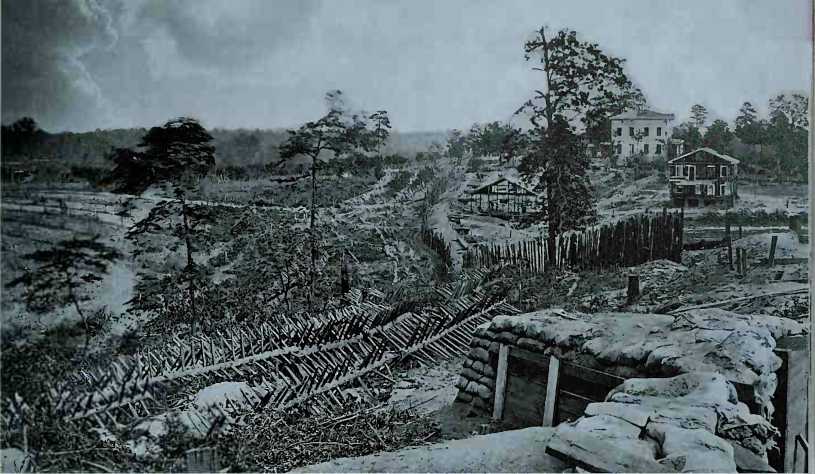
Atlanta bristled with barricades and gnns. But Shemian wonld crack its defenses and bring Georgia to its knees.
Total War. In taking Atlanta, Sherman had destroyed much of the Souths ability to supply its soldiers. The Confederacy was now wide open for Shermans next move—a march across Georgia to the Atlantic.
The general was determined to cut the heart out of Southerners’ support for the Confederacy. By scorching their rich farmland and plantations, Sherman also aimed to teach Georgians a lesson they wouldn’t forget. "We can make war so terrible,” he declared, "and make them so sick of war that generations [will] pass away before they again appeal to it.”
With Hood’s army no longer a threat, Sherman promised "to make Georgia howl.” He began by burning all militaiy buildings within Atlanta. On the night of November 15, he left the rich Gate City of the South in flames. Atlanta, in Sherman’s words, was now "a thing of the past.”
Sacking Georgia. Sherman split his 62,000 troops into two columns. They marched on parallel routes southeast through Georgia. Sherman gave up his supply lines—they would slow him down too much. Instead, he gave his troops permission to “forage liberally on the country.”
His men took him at his word, scavenging for food, looting every plantation in their path. "We had a gay old campaign,” one Union private recalled. "Destroyed all we could not eat, burned their cotton and gins, spilled their sorghum (molasses),...burned and twisted their railroads and raised Hell, generally.”
On December 20, the Union army captured the sea-coast city of Savannah. The campaign across Georgia had been one of the most daring, successful, and
“War is the remedy our enemies have chosen, and I say, let ns give them all they want....”
— General William Tecumseli Sherman
Destructive in military history. In her diary of the war, Mary Chestnut wrote: "They say no living thing is found in Sherman’s track, only chimneys, like telegraph poles, to carry the news of [his] attack backwards.”
"War is hell,” said Sherman, and he clearly practiced what he preached. But the bitter legacy of the general’s march to the sea would be remembered for generations.




 World History
World History
